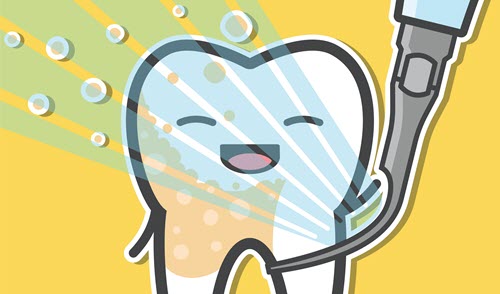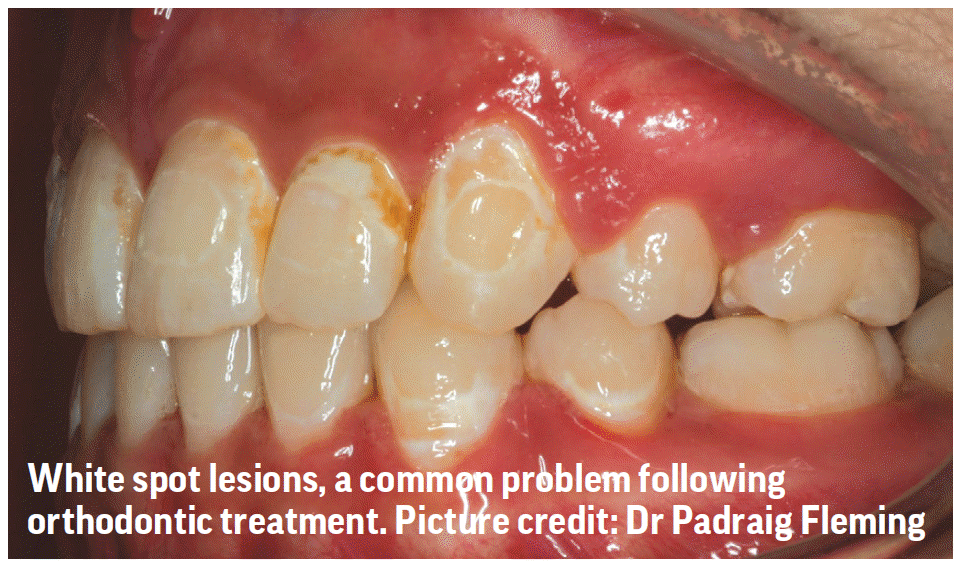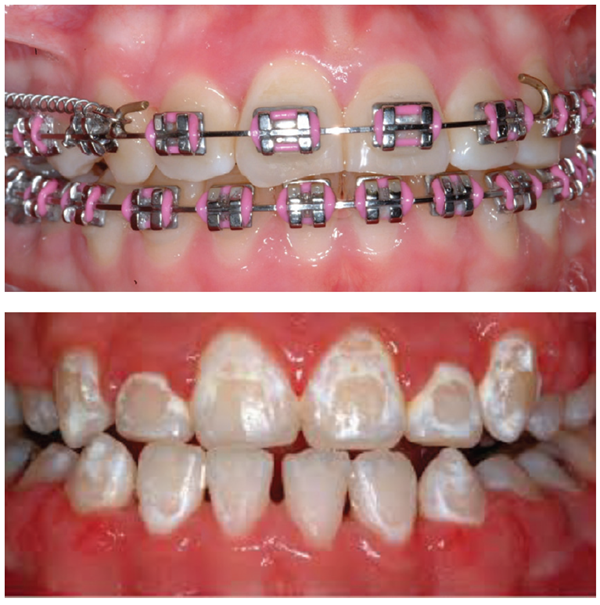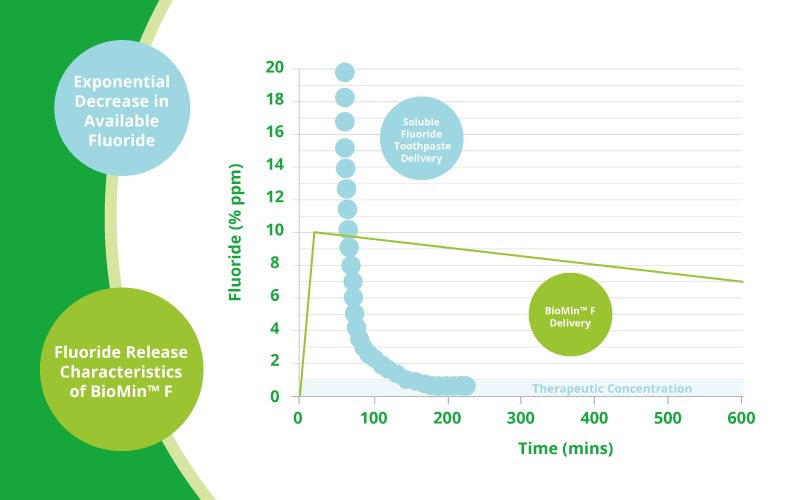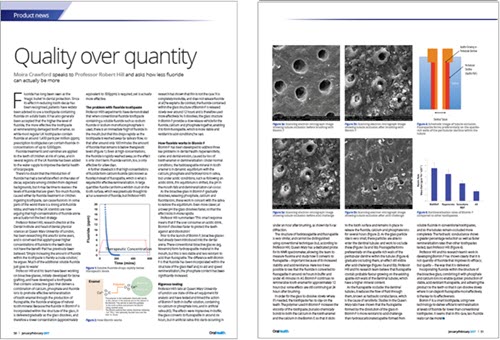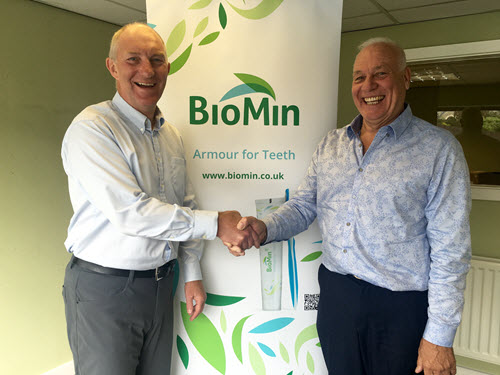Unlike conventional toothpastes that contain soluble fluoride, BioMin® F toothpaste incorporates calcium, fluoride and phosphate ions within the structure of the active ingredient.
When you brush with BioMin® F, the particles adhere to the teeth, where they dissolve slowly over up to 12 hours, releasing these ions where they work in concert with saliva to form fluorapatite.
"Fluorapatite is more stable and ten times more resistant to acid attack than hydroxyapatite"
Read More
More BioMin News
By Moira Crawford, freelance health writer and editor.
‘I apply a smear layer of BioMin® F toothpaste after Guided Biofilm Therapy (GBT), and this provides a protective barrier, remineralising the tooth surface and preventing sensitivity and staining, until the pellicle is restored’
Sam Davison, hygienist SE England
I have been practising Guided Biofilm Therapy (GBT) for some time now, as it is an effective and minimally invasive technique to remove biofilm from patients’ teeth. Biofilm has been shown to be an important precursor to caries, periodontal disease and peri-implant infections.
GBT involves the use of prophylaxis to remove this bacterial layer, but as it does so, it also removes the protective pellicle on the surface of the teeth, stripping it back to the surface, which leaves it at risk of developing sensitivity and of picking up stains.
Read More
More BioMin News
The controlled release of fluoride at a low dose for many hours after brushing may be more effective at remineralising early lesions than increasing the amount of fluoride in toothpaste, reports Moira Crawford
Fluoride has been a standard ingredient of toothpaste ever since it was found to have a beneficial effect in preventing tooth decay. It has played a huge part in improving dental health, and soluble fluoride has been added to toothpaste, varnishes and drinking water in certain areas.
However, it has traditionally been held that increasing the concentration of fluoride within a product would correspondingly increase its efficacy. As a result, therapeutic toothpastes can contain up to 5000ppm fluoride with the aim of strengthening teeth and preventing tooth decay for high-risk patients.
Wasted fluoride
However, research has shown the quantity of soluble fluoride in toothpaste is not the complete answer. Professor Robert Hill, research director at the Dental Institute and head of dental physical sciences at Queen Mary University, London, believes much of the fluoride in conventional toothpastes go to waste.
Studies have shown that when conventional toothpaste containing a soluble fluoride is used, there is an immediate ‘high’ of fluoride in the mouth, but this drops exponentially as the toothpaste is washed away by the salivary flow. After about 100 minutes the amount of fluoride in saliva decreases below therapeutic levels – irrespective of the initial concentration (Figure 1 on the article).
Read More
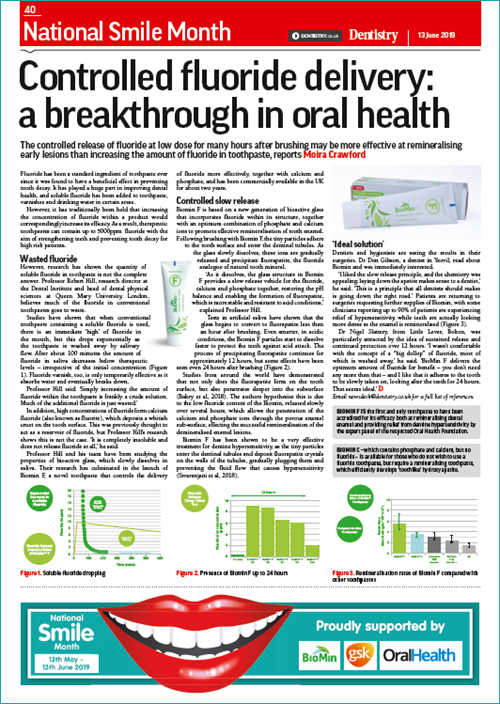
More BioMin News
A new comparative study has confirmed that BioMinF is more effective than other toothpastes tested in reducing sensitivity following scaling and root planing, something dental hygienists are already finding. Moira Crawford reports...
Sensitivity following scaling and root planing is a common problem, and one that dental hygienists and therapists are only too familiar with. Many patients with sensitivity problems have tried a number of toothpastes without success, and either suffer after scaling procedures or cannot even bear to endure them. Others find that the procedure triggers sensitivity.
Now an innovative new toothpaste has been launched, BioMinF, which takes a different approach to the treatment and prevention of sensitivity. It has been shown not only to improve the problem on a daily basis but also to have an immediate effect in reducing sensitivity straight after scaling.
Read More
More BioMin News
Significantly high levels of oral disease found among GB's elite athletes is leading to poorer on-field performance, according to research by UCL's Eastman Dental Institute.
Nearly half of the athletes were found to have untreated tooth decay, 77% had gingivitis and 39% self-reported having bleeding gums. More than a third reported that these conditions had impacted negatively on their sporting performance.
Read More
More BioMin News
Tooth decay is the leading cause of hospitalisation in UK children, and yet it is easily prevented, so why are the numbers so high?
Biomin featured in the Dental Health special report this week, published in The Times, and explores this question, with an infographic on our shifting diets and comment on the threat sugar poses to children and their teeth.
The Biomin article on page 7, entitled 'Combat the pain of sensitive teeth' explains how the toothpaste could significantly reduce dental decay as well as solving tooth sensitivity problems.
There are many other articles and the report is available here to download. Enjoy!
Read More
New research shows that BioMin™ F is capable of remineralising both the tooth surface and the sub-surface enamel
Young patients wearing fixed orthodontic appliances run a higher risk of caries than those who do not. If decay develops during the orthodontic treatment, then white spot lesions (formed by demineralisation of the tooth enamel around the brackets) can appear and damage the newly straightened teeth.
BioMin F, a new toothpaste based on bioactive glass technology, was already shown to be effective in remineralising tooth enamel and improving symptoms of sensitivity (Sivaranjani, 2018). Now, a new study has shown that the effects penetrate even deeper into the tooth – remineralising the sub-surface enamel and improving or reversing the white spot lesions (Bakry et al, 2018).
Read More
Congratulations to Cara Green of Romford, Essex who scooped the top prize in BioMin's Clinical Case Study Award 2018.
The judging panel was Prof Robert Hill, Dr David Gillam and Dr Marina Harris who agreed Cara's study was well laid out and structured, an attractive presentation and well referenced. You can download it here.
As well as kudos and exposure for winning, Cara was presented with a certificate and set of top quality instruments, kindly donated by Hu Friedy.
The runners up, who also presented very good quality case studies were Gulag Singh of Huntingdon and Felicity Heath of Bournemouth.
The competition was also launched in Lithuania and the winner, Viktorija Butrimaviciene, was sponsored by BioMin Technologies Ltd to spend the weekend at the Oral Health Conference & Exhibition in Telford.
Certificates were presented by Phil Mathers (pictured), CEO of Trycare Ltd who are the UK distributors of Biomin toothpaste.
Read More
White spot lesions due to demineralisation of tooth enamel are a common side-effect of orthodontic treatment, and a potential precursor to caries. The use of products based on bioactive glass which forms fluorapatite to remineralise the tooth surface could reduce the risk of white spot lesions in these patients.
Orthodontic treatment has never been more popular. With the current emphasis on oral aesthetics, not only teenagers but adults are seeking to improve the alignment of their teeth for a perfect smile.
There can, however, be an unfortunate ill-effect to the use of bonded orthodontic appliances: demineralisation of the tooth enamel around the brackets, ie white spot lesions (WSL). WSL are defined as ‘subsurface enamel porosity from carious demineralisation’, which are visible as a milky white opacity on the tooth surface, slightly softer than the surrounding smooth enamel.
Read More
Biomin F toothpaste, based on bioactive glass technology, has been available for several months now. Moira Crawford talks to clinicians with over a year’s experience of Biomin, who say 90% of patients are reporting relief from sensitivity problems.
Dentine sensitivity is a big deal for patients. Discomfort or pain, particularly in reaction to hot or cold food and drinks, or even cold air, is common in the general population, and can cause acute distress, having a genuine impact on people’s lives.
Sufferers come to their dentist seeking relief from the pain of hypersensitivity and, as a result, there is a wide range of toothpastes aimed at patients with sensitivity available on the market. Many patients have tried them all, with varying degrees of success.
That’s because dentine hypersensitivity is not straightforward to treat. A UK expert forum on dentine hypersensitivity produced management guidelines, which identified three main categories into which patients with hypersensitivity will fall, and different management strategies appropriate to each (Gillam et al, 2013).
‘There isn’t one single cause of sensitivity, so there can’t be a single product that is the gold standard,’ explained Dr David Gillam, who chaired the forum. ‘It’s like Cinderella’s slipper – one size does not fit all.’
"It's not the amount of fluoride that counts but the length of time it's in contact with the tooth"
Read More
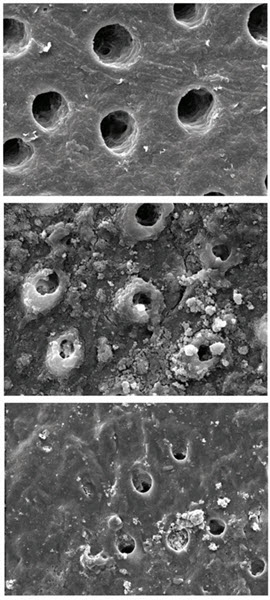
Written by Chris Branfield, Principal Dentist at Castle Park Dental Care, Cottingham.
A while ago I was asked to do a TV advert for Sensodyne. I liked their “Repair and Protect” toothpaste because it contains a bio-glass that sticks to surface like a protective layer and helps stop tooth sensitivity. However, there is now a new toothpaste containing an even more beneficial bio-glass called Biomin.
Traditionally, to try and strengthen teeth and protect against decay with a toothpaste, fluoride is used in quite high concentrations. Most adult toothpastes have 1,450 parts per million (ppm) and one that has to be prescribed contains 5,000ppm. That’s a lot of fluoride! This is soluble fluoride so it washes away quite quickly and has to be used correctly and not swallowed.
Research shows that you benefit more from low doses of fluoride with a sustained release than from a high dose that washes away.
"It is not the amount of fluoride that counts but the length of time it is in contact with the teeth".
Read More
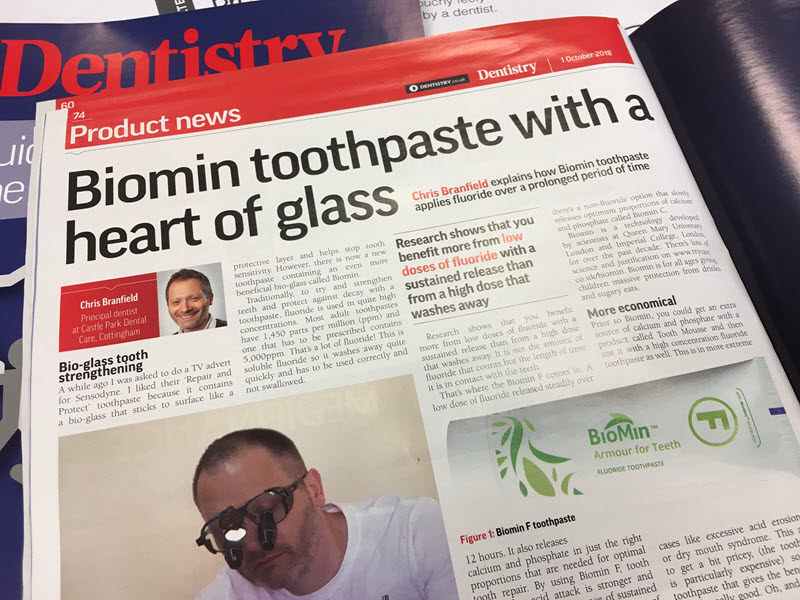
Toothpaste alone does not prevent dental erosion, new research suggests.
After analysing nine fluoridated toothpastes that are available throughout Europe, including Colgate Caries Protection and Sensodyne Rapid Relief, Swiss researchers found enamel loss still occurs to some extent despite regular brushing.
Although none of the toothpastes studied prevent dental erosion, Blend-a-Med Pro Expert and Regenerate were found to be the least effective, while Sensodyne Pronamel and Elmex Erosion Protection are no better than saliva.
Read More
Oral Health magazine asks Professor Robert Hill how less fluoride can actually be more.
Key Headings:
-
'The Problem With Fluoride Toothpastes'
-
'How Fluoride Works In BioMinF'
-
Rigorous Testing''
Click here to download the full report.
Read More
It’s been smiles all round since the introduction of BioMinF toothpaste to the UK consumer & professional markets
BioMinF puts back the lost minerals from tooth enamel and helps prevent decay and treats sensitivity.
Thousands of tubes of the toothpaste were sold within a few weeks of launching the product in the UK and the feedback received from customers has been “overwhelmingly positive”, says Richard Whatley, CEO of Biomin Technologies Ltd.
"The potential of this toothpaste is massive"
Read More




